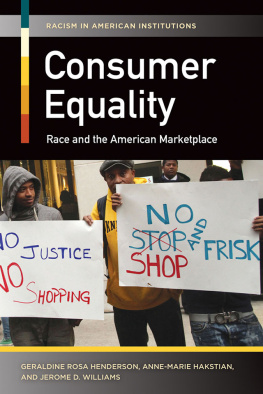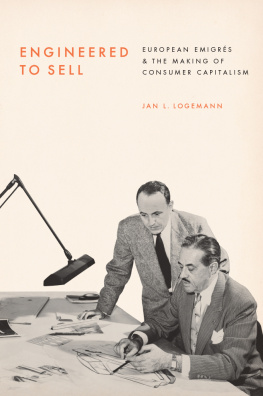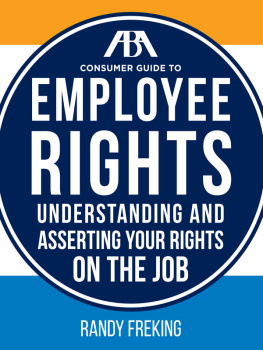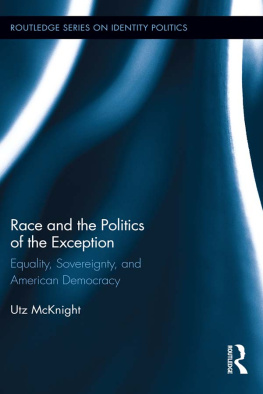Consumer Equality
Recent Titles in
Racism in American Institutions
Brian D. Behnken, Series Editor
The Color of Politics: Racism in the American Political Arena Today
Chris Danielson
How Do Hurricane Katrinas Winds Blow? Racism in 21st-Century New Orleans
Liza Lugo, JD
Out of Bounds: Racism and the Black Athlete
Lori Latrice Martin, Editor
Color behind Bars: Racism in the U.S. Prison System
Volume 1: Historical and Contemporary Issues of Race and Ethnicity in the American Prison System
Volume 2: Public Policy Influence(s) toward a Racial/Ethnic American Prison System
Scott Wm. Bowman, Editor
White Sports/Black Sports: Racial Disparities in Athletic Programs
Lori Latrice Martin
Racism in American Popular Media: From Aunt Jemima to the Frito Bandito
Brian D. Behnken and Gregory D. Smithers
Voting Rights under Fire: The Continuing Struggle for People of Color
Donathan L. Brown and Michael Clemons
The Race Controversy in American Education
Lillian Dowdell Drakeford, PhD, Editor
How Racism and Sexism Killed Traditional Media: Why the Future of Journalism Depends on Women and People of Color
Joshunda Sanders
The School to Prison Pipeline: Education, Discipline, and Racialized Double Standards
Nancy A. Heitzeg
Consumer Equality
Race and the American Marketplace
Geraldine Rosa Henderson,
Anne-Marie Hakstian, and
Jerome D. Williams
Racism in American Institutions
Brian D. Behnken , Series Editor
Copyright 2016 by Geraldine Rosa Henderson, Anne-Marie Hakstian, and Jerome, D. Williams
All rights reserved. No part of this publication may be reproduced, stored in a retrieval system, or transmitted, in any form or by any means, electronic, mechanical, photocopying, recording, or otherwise, except for the inclusion of brief quotations in a review, without prior permission in writing from the publisher.
Library of Congress Cataloging-in-Publication Data
Names: Henderson, Geraldine R. (Geraldine Rosa), 1963 author. | Hakstian, Anne-Marie, author. | Williams, Jerome D., 1947 author.
Title: Consumer equality : race and the American marketplace / Geraldine Rosa Henderson, Anne-Marie Hakstian, and Jerome D. Williams.
Description: Santa Barbara, California : Praeger, [2016] | Series: Racism in American institutions | Includes index.
Identifiers: LCCN 2016019565 (print) | LCCN 2016031005 (ebook) | ISBN 9781440833762 (alk. paper) | ISBN 9781440833779 (ebook)
Subjects: LCSH: ConsumersUnited States. | Minority consumersUnited States. | RacismUnited States | MarketingSocial aspectsUnited States. | Customer relationsUnited States.
Classification: LCC HC110.C6 H425 2016 (print) | LCC HC110.C6 (ebook) | DDC 339.4/708900973dc23
LC record available at https://lccn.loc.gov/2016019565
ISBN: 978-1-4408-3376-2
EISBN: 978-1-4408-3377-9
20 19 18 17 16 1 2 3 4 5
This book is also available as an eBook.
Praeger
An Imprint of ABC-CLIO, LLC
ABC-CLIO, LLC
130 Cremona Drive, P.O. Box 1911
Santa Barbara, California 93116-1911
www.abc-clio.com
This book is printed on acid-free paper 
Manufactured in the United States of America
Contents
Consumer Equality is the first book in Praeger series, Racism in American Institutions (RAI), to explore economic inequality and the practice of shopping while black or brown. The RAI series examines the ways in which racism has become, and remains, a part of the fabric of many American institutions. For example, while the United States may have done away with overtly racist acts such as extralegal lynching, racism still affects many of Americas established institutions from police departments to corporate offices. Schools may not be legally segregated, and yet many districts are not integrated. Prisons are another example, when one considers the racist policies within the legal and penal systems that account for so many people of color behind bars. This open-ended series of one-volume works examines the problem of racism in established American institutions. Each book in the RAI Series traces the prevalence of racism within a particular institution throughout the history of the United States and explores the problem in that institution today, looking at ways in which the institution has attempted to rectify racism, but also the ways in which it has not.
In Consumer Equality, Geraldine Rosa Henderson, Anne-Marie Hakstian, and Jerome D. Williams examine the heretofore unexplored phenomenon of consumer inequality. They show that while racist inequities have plagued communities of color for generations, consumer inequality has gone relatively unnoticed. Most especially is the problem of shopping while black or brown, a type of racial profiling that African Americans, Latino/as, and other ethnic communities encounter with great frequency in the American marketplace. Consumer Equality explores a variety of real-life incidences of racism in the marketplace. It also analyzes a host of lawsuits filed by consumers against companies that utilize racist practices in their business operations. The book also includes an important section on how business can reduce instances of consumer racism, particularly through the use of new organizing frameworks designed to establish legitimate consumer equality. Multidisciplinary and far reaching, Consumer Equality offers a thorough historical overview of market inequality, a contemporary focus on present day issues, and critical analysis of consumer inequality in American society.
The authors of Consumer Equality are all recognized experts in the field. Geraldine Rosa Henderson, an associate professor of marketing at Loyola University, Chicago, has written numerous works on marketplace diversity, branding and marketing, and consumer networks. Anne-Marie Hakstian is a professor of business at Salem State University. She has published many articles on marketplace discrimination and jury bias in market discrimination cases. Jerome D. Williams is provost and executive vice chancellor at Rutgers University. His published work includes studies on marketing to multicultural consumers, Internet privacy issues, and public health communication. Taken together, the three authors of Consumer Equality have an amazing breadth of academic and administrative experience, nearly 200 total publications, and multiple degrees. They have produced a thoroughly authoritative book.
Brian D. Behnken
Iowa State University
Ames, Iowa
Ask any cultural observer if they have heard of shopping while black or brown, and it is likely that they have not. Yet, racial profiling is a recurring topic of discussion due to extensive media coverage of incidents involving police officers who are accused of enforcing laws differently based on the race or ethnicity of individuals. Most recently, the deaths of Eric Garner (NYC), Michael Brown (Ferguson, MO), Trayvon Martin (Florida), and Tamir Rice (Ohio) have heightened and reignited the national conversation about race and law enforcement and have challenged the notion that America is a postracial society. However, in the wake of recent incidents involving Barneys and Macys customers who were stopped and accused of credit or debit card fraud aft er they purchased high-end items, an important and intriguing question presented itself: do racial profiling and other forms of race discrimination occur in the marketplace?










